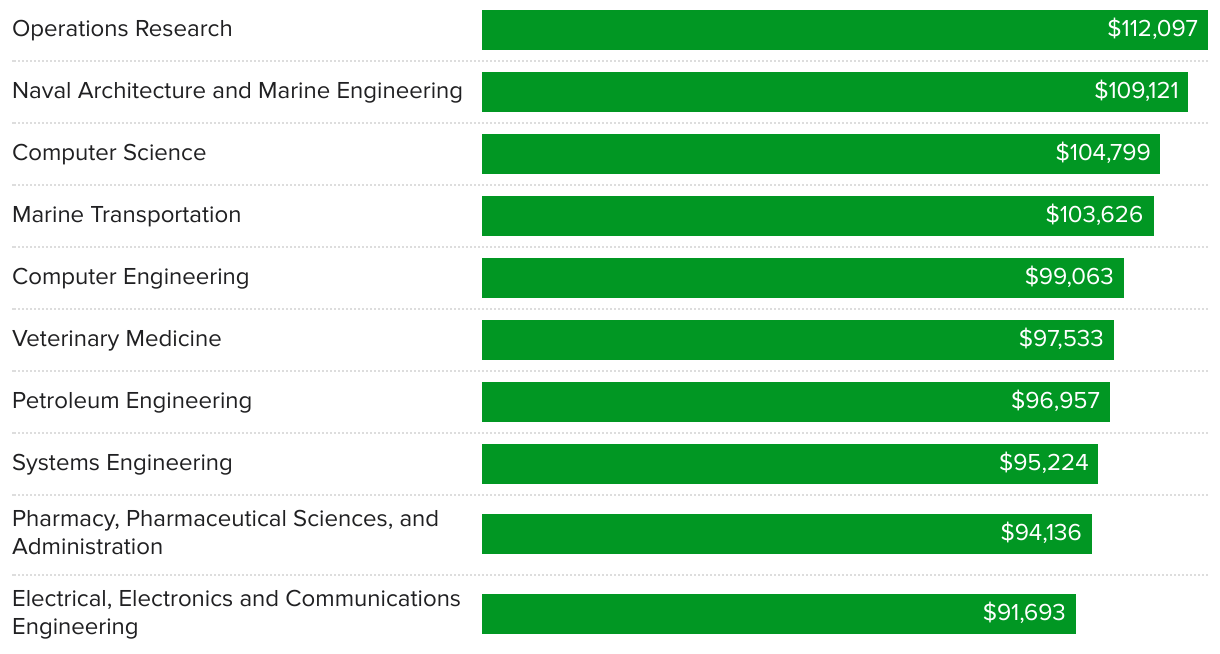College majors have a big impact on income. Here are the highest- and lowest-earning fields.
Getting a college degree is a financial commitment with a big impact on future earnings. New research finds that a student's major, along with their alma mater, can make a huge difference in their average salary four years after graduating.
The college majors that lead to top-paying jobs tend to be focused in so-called STEM fields, or science, technology, engineering and mathematics, according to a new analysis from the HEA Group. Founded by Michael Itzkowitz, the former director of the Department of Education's College Scorecard, HEA provides data on college costs and other topics.
The top-paying majors aren't the most popular fields with students, Itzkowitz's research found. Those belong to business administration, nursing and psychology, where grads can earn respectable incomes four years after college, at about $58,000, $77,000 and $43,000 respectively. Even the much-maligned English degree pulls in a larger number of students than computer science, a field where grads earn more than double the typical $42,000 annual salary of Shakespeare aficionados, the analysis found.
A STEM degree "isn't what people most want to focus on when entering an institution of higher learning," Itzkowitz told CBS MoneyWatch.
That suggests that pursuing a top-earning major might not be perceived by students as a path to fulfillment, or simply that many students don't have the technical skills to pursue computer science or engineering in college. Yet with the increase in college costs, with tuition far outpacing inflation, students are increasingly under pressure to pick a major that will allow them to repay their loans and help them gain a foothold in the middle class.
"Because the number one reason students attend college is for greater employability, it's critical that most college students earn as much as, or more, than a typical high school grad in their state," Itzkowitz said.
Earning a college degree is the surest path to landing a good job by age 30, according to a recent analysis from Georgetown University Center on Education and the Workforce. A good job, as defined by the study, is one that pays a median annual wage of $57,000 by age 30.
By four years after graduating, most grads are on their way to earning middle-class salaries, the HEA Group found. About two-thirds of college programs are producing grads who earn at least $40,000 four years after they receive their degree. However, grads from about 3% of college programs are earning less than $20,000 annually, which could lead to financial hardship, Itzkowitz noted.
Four years after graduating, the typical bachelor's degree holder earns about $57,000 annually, the HEA Group found. Some humanities and arts-related fields earn much less, though, such as English majors, who have income of about $42,000 annually by the time they are four years out of college.
While people without college degrees can earn solid pay — and even earn more than someone with a bachelor's degree — there is, on average, a significant wealth and income gap between Americans with a college degree and those without, according to new research from Third Way. Those without a college degree are also five times as likely than people with diplomas to be in poverty and lack health insurance, it found.
The typical college grad between 25 to 64 years old has an annual income of $127,000, compared with the typical pay of $61,000 for those without a degree, Third Way found. And college grads on average have four times the wealth as workers without bachelors degrees, it noted.
"College is worth it," Itzkowitz said. "Most deliver on that promise, but there are some that don't."
College majors that make the most money
The highest paying college majors are focused in STEM field, yet there are some niche subjects among them, like naval architecture and marine engineering, with grads in those fields earning an average of $109,121 four years after they graduate. Marine transportation, at No. 4, provides typical earnings of $103,626 four years after getting a piece of parchment.
The research "is a great starting point for students or families that are considering a post-secondary decision," Itzkowitz said. "If they know the major and the institutions that they are looking at applying for, this supplies info about how much they can make within a few years after they graduate."
Students who pursue high-paying majors at top universities add juice to their earnings, the research suggests. For instance, computer science majors (the third highest-earning field) who attend Harvard University (ranked No. 3 by U.S. News and World Report) have the highest pay of any college graduate, earning an average of $256,539 annual salary four years after graduation.
That may underscore why so many high school students try to get into Ivy League colleges or the equivalent, such as high-ranking institutions like Stanford University or the Massachusetts Institute of Technology. Yet very few are able to gain entry into these schools, with only 0.4% of students attending an Ivy League college like Harvard or Yale, according to U.S. News and World Report.
Most of the top-earning grads attended private, nonprofit colleges such as Harvard, Caltech and Carnegie Mellon. But a few public universities also produced high-earning grads, such as University of California, Berkeley; California Polytechnic State University at San Luis Obispo and University of Washington, the research found.
"These are outliers, the top schools," Itzkowitz noted. "It's the other schools that are serving more people."

